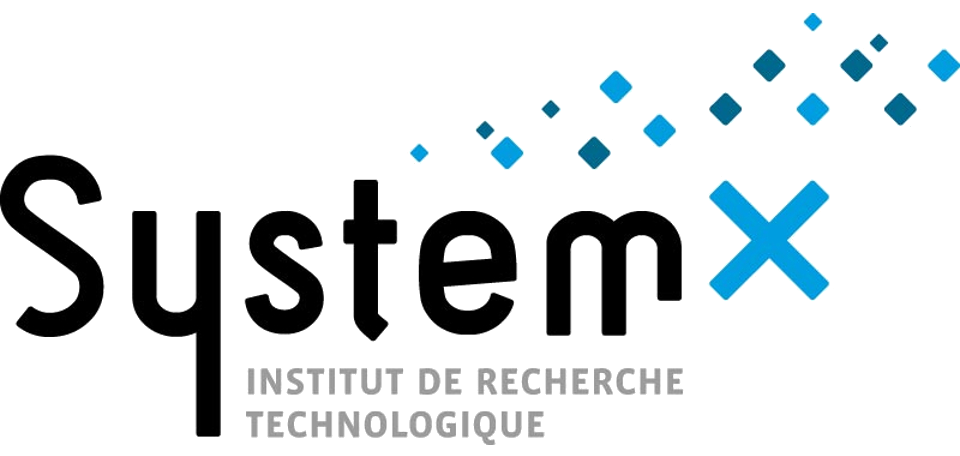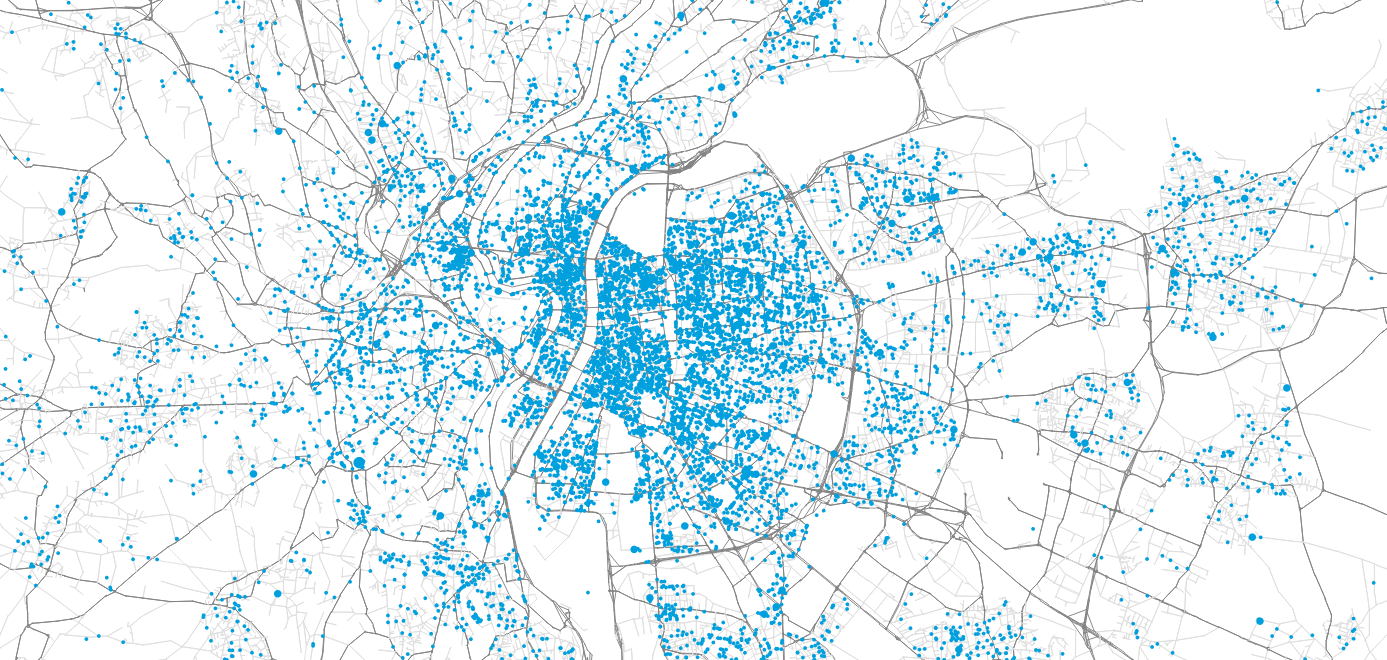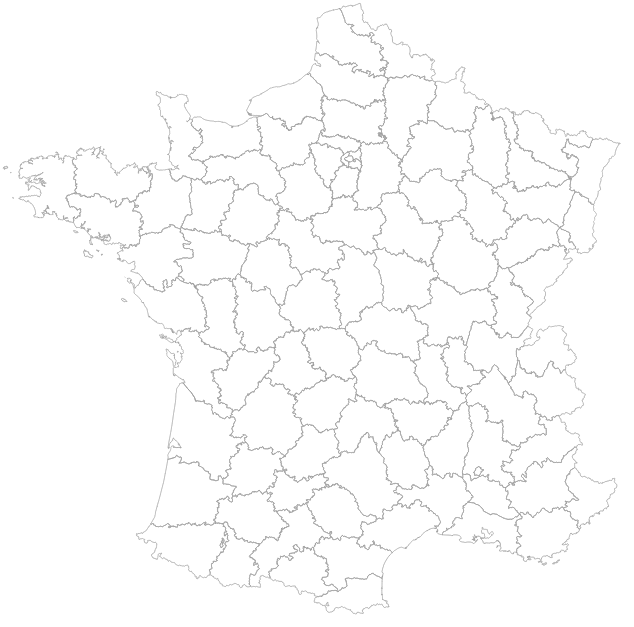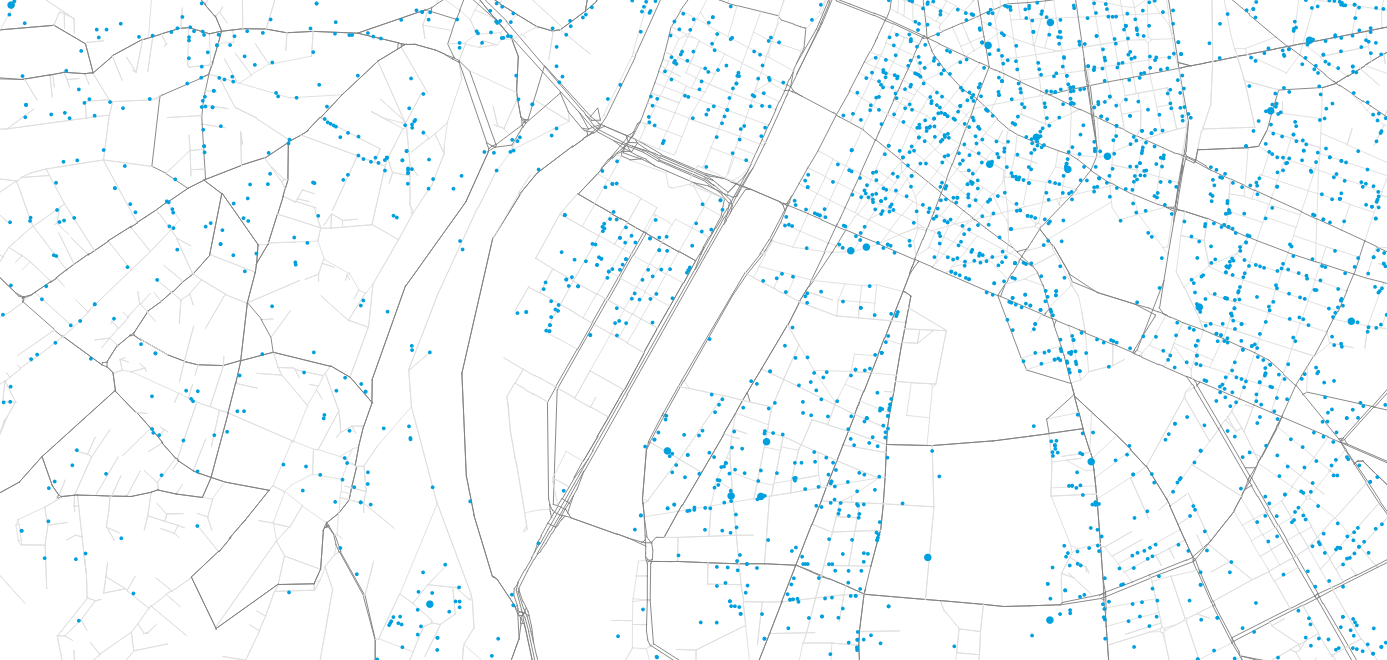
The Horizon LEAD project
Preliminary results and tools
Sebastian Hörl
9 September 2022
ATEC

LEAD Project

Low-emission Adaptive last-mile logistics supporting on-demand economy through Digital Twins
- H2020 Project from 2020 to 2023
- Six living labs with different innovative logistics concepts
- Lyon, The Hague, Madrid, Budapest, Porto, Oslo
- One partner for implementation and one for research each
- Development of a generic modeling library for last-mile logistics scenario simulation and analysis

Lyon Living Lab

- Peninsula Confluence between Saône and Rhône
- Interesting use case as there are limited access points
- Implementation of an urban consolidation center (UCC) to collect the flow of goods and organize last-mile distribution
- using cargo-bikes
- using electric robots
- and others
- Analysis and modeling through
- Flow estimation through cameras
- Simulation of future scenarios
- Focus on parcel deliveries due to data availability


Approach

-
Estimating the impact of parcel deliveries in a city
- City model, to prepare data processing for local analyses
- Mitigating the lack of demand and supply information
-
Deployment scenarios for an Urban Consolidation Center
- Local analysis for Lyon Confluence
- Tool to integrate and assess real-world data
- Outlook: Open modeling of regional goods flows




Modeling methodology

- Main question: What is the impact on traffic and population of implementing an Urban Consolidation Center in Confluence?
- Focus on B2C parcel deliveries due to data availability

Modeling methodology

Agent-based simulation of Lyon
- Main question: What is the impact on traffic and population of implementing an Urban Consolidation Center in Confluence?
- Focus on B2C parcel deliveries due to data availability

Modeling methodology


Agent-based simulation of Lyon
Demand in parcel deliveries
- Main question: What is the impact on traffic and population of implementing an Urban Consolidation Center in Confluence?
- Focus on B2C parcel deliveries due to data availability

Modeling methodology





Agent-based simulation of Lyon
Demand in parcel deliveries
Distribution by operators
- Main question: What is the impact on traffic and population of implementing an Urban Consolidation Center in Confluence?
- Focus on B2C parcel deliveries due to data availability

Modeling methodology






Agent-based simulation of Lyon
Demand in parcel deliveries
Distribution by operators
KPI Calculation
- Main question: What is the impact on traffic and population of implementing an Urban Consolidation Center in Confluence?
- Focus on B2C parcel deliveries due to data availability



Population census (RP)

Income data (FiLoSoFi)

Commuting data (RP-MOB)
National HTS (ENTD)

Enterprise census (SIRENE)

OpenStreetMap

GTFS (SYTRAL / SNCF)

Address database (BD-TOPO)
Methodology: Synthetic travel demand


EDGT
Synthetic travel demand has been generated for Lyon in order to perform agent-based mobility simulation of all residents' movements.











0:00 - 8:00
08:30 - 17:00
17:30 - 0:00
0:00 - 9:00
10:00 - 17:30
17:45 - 21:00
22:00 - 0:00







Population census (RP)

Income data (FiLoSoFi)

Commuting data (RP-MOB)
National HTS (ENTD)

Enterprise census (SIRENE)

OpenStreetMap

GTFS (SYTRAL / SNCF)

Address database (BD-TOPO)
Methodology: Synthetic travel demand


EDGT
Synthetic travel demand has been generated for Lyon in order to perform agent-based mobility simulation of all residents' movements.


Methodology: Synthetic travel demand
Open
Data


Open
Software
+
=
Reproducible research
Integrated testing

Population census (RP)

Income data (FiLoSoFi)

Commuting data (RP-MOB)
National HTS (ENTD)

Enterprise census (SIRENE)

OpenStreetMap

GTFS (SYTRAL / SNCF)

Address database (BD-TOPO)


EDGT
Synthetic travel demand has been generated for Lyon in order to perform agent-based mobility simulation of all residents' movements.


Methodology: Synthetic travel demand

Open
Software
=
Reproducible research
Integrated testing

Open
Data


Open
Software
+
=
Reproducible research
Integrated testing

Population census (RP)

Income data (FiLoSoFi)

Commuting data (RP-MOB)
National HTS (ENTD)

Enterprise census (SIRENE)

OpenStreetMap

GTFS (SYTRAL / SNCF)

Address database (BD-TOPO)


EDGT
Synthetic travel demand has been generated for Lyon in order to perform agent-based mobility simulation of all residents' movements.


Methodology: Synthetic travel demand












Methodology: Parcel demand


Synthetic population

+
Synthetic population
Out-of-home purchase survey
Achats découplés des ménages

Based on sociodemographic attributes of the households, parcels are generated for the city on an average day.

Gardrat, M., 2019. Méthodologie d’enquête: le découplage de l’achat et de la récupération des marchandises par les ménages. LAET, Lyon, France.
Methodology: Parcel demand


Synthetic population

+
Synthetic population
Out-of-home purchase survey
Achats découplés des ménages

Based on sociodemographic attributes of the households, parcels are generated for the city on an average day.


Gardrat, M., 2019. Méthodologie d’enquête: le découplage de l’achat et de la récupération des marchandises par les ménages. LAET, Lyon, France.
Methodology: Parcel demand


Synthetic population

+
Synthetic population
Out-of-home purchase survey
Achats découplés des ménages

Based on sociodemographic attributes of the households, parcels are generated for the city on an average day.



Gardrat, M., 2019. Méthodologie d’enquête: le découplage de l’achat et de la récupération des marchandises par les ménages. LAET, Lyon, France.
Methodology: Parcel demand


Synthetic population

Gardrat, M., 2019. Méthodologie d’enquête: le découplage de l’achat et de la récupération des marchandises par les ménages. LAET, Lyon, France.
+
Synthetic population
Out-of-home purchase survey
Achats découplés des ménages

Based on sociodemographic attributes of the households, parcels are generated for the city on an average day.




Gardrat, M., 2019. Méthodologie d’enquête: le découplage de l’achat et de la récupération des marchandises par les ménages. LAET, Lyon, France.
Methodology: Parcel demand


Synthetic population

Gardrat, M., 2019. Méthodologie d’enquête: le découplage de l’achat et de la récupération des marchandises par les ménages. LAET, Lyon, France.
+
Synthetic population
Out-of-home purchase survey
Achats découplés des ménages

Based on sociodemographic attributes of the households, parcels are generated for the city on an average day.
Iterative proportional fitting (IFP)
- Based on synthetic population, find average number of purchases delivered to a household defined by socioprofesional class, age of the reference person and household size per day.

Methodology: Parcel demand


Synthetic population

Gardrat, M., 2019. Méthodologie d’enquête: le découplage de l’achat et de la récupération des marchandises par les ménages. LAET, Lyon, France.
+
Synthetic population
Out-of-home purchase survey
Achats découplés des ménages

Based on sociodemographic attributes of the households, parcels are generated for the city on an average day.
Maximum entropy approach
- We now the average number of parcels, but we do not now the distribution of the number of parcels for a household on an average day.
- We know it must be non-negative, and we know the mean.
- Without additional data, we assume maximum entropy distribution, which is Exponential in this case.
Methodology: Parcel demand


Synthetic population

Gardrat, M., 2019. Méthodologie d’enquête: le découplage de l’achat et de la récupération des marchandises par les ménages. LAET, Lyon, France.
+
Synthetic population
Out-of-home purchase survey
Achats découplés des ménages

Based on sociodemographic attributes of the households, parcels are generated for the city on an average day.

Methodology: Parcel demand


Synthetic population

Gardrat, M., 2019. Méthodologie d’enquête: le découplage de l’achat et de la récupération des marchandises par les ménages. LAET, Lyon, France.
+
Synthetic population
Out-of-home purchase survey
Achats découplés des ménages

Based on sociodemographic attributes of the households, parcels are generated for the city on an average day.

Methodology: Parcel demand


Synthetic population

Gardrat, M., 2019. Méthodologie d’enquête: le découplage de l’achat et de la récupération des marchandises par les ménages. LAET, Lyon, France.
+
Synthetic population
Out-of-home purchase survey
Achats découplés des ménages

Based on sociodemographic attributes of the households, parcels are generated for the city on an average day.

Methodology: Supply side


Using shares of customer preference, parcels are assigned to operators and the closest distribution centers.

SIRENE: Delivery centers


Methodology: Supply side


Using shares of customer preference, parcels are assigned to operators and the closest distribution centers.

SIRENE: Delivery centers




Methodology: Supply side


Using shares of customer preference, parcels are assigned to operators and the closest distribution centers.

SIRENE: Delivery centers






Methodology: Supply side


Vehicle routing and fleet composition problem
- Minimize total cost of delivering all parcels for each center
- Distance cost influenced by fuel / electricity cost
- Fixed cost (per day) influenced by salaries and vehicle cost
- Derive
- Distances driven and related emissions
- Fleet composition for each center


Novel approximation method
Visualisation platform



UCC platform



Outlook: Open goods transport model


- Model the flows between companies on a territory
- Based on FRETURB methodology, but using open data
- SIRENE (company locations, sizes, classification)
- Logistics surveys (Île-de-France, Bordeaux, Dijon)
- High-level statistics
Generate demand
Generate movements
Generate routes

Next steps


- Research publications
- Making results accessible
- Packaging up
- Integration with MATSim + Impact assessment
Questions?



Preliminary results and scenarios


Grand Lyon 2022 (Baseline)

Preliminary results and scenarios


Grand Lyon 2030

Preliminary results and scenarios


Zoom: Confluence 2022


Preliminary results and scenarios


Zoom: Confluence 2030



+ 17,000 habitants
Preliminary results and scenarios


Scenario: Urban Consolidation Center in Confluence 2030

- UCC in Confluence, last-mile delivery through cargo bikes

Overview LEAD
By Sebastian Hörl
Overview LEAD
ATEC, 9 September 2022
- 758



